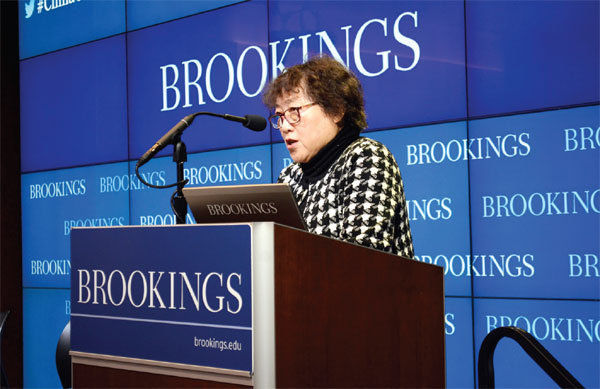Sex education in China evolving
China is making strides on sex education in schools, according to a noted sexologist in the country.
"The Chinese government's general attitude (toward sexuality and sex education) has been more and more open," Li Yinhe, a leading sexologist in China and a fellow with the Institute of Sociology at the Chinese Academy of Social Sciences, told China Daily at the Brookings Institution on Friday.
"When I was in Peking University back in 1988, I intended to open a course on the sociology of sex, but the university did not approve it." Li said. "But Renmin University later opened a similar course, lectured by Pan Suiming."
Pan, a well-known sexologist in China, is the founder and director of the Institute of Sexuality and Gender at Renmin University. He has run a series of courses on the sociology of sex since the 1980s, which are well received by college students. He said at the Institute of Sexuality and Gender that "sex education should be a part of the compulsory education".
The panelists made some comparisons between sex education in the US and China.
"Students cannot start to receive sex education after entering their adolescence, because all the compulsory education is 'advanced'," Pan said. "Also, it (sex education) should be absolutely 'compulsory', not only for students, but also for parents and government."
"Elementary sex education on students in the US begins from primary or secondary schools," Wang Zheng, associate professor of Women and Gender Studies at the University of Michigan, told China Daily when asked about the differences in sex education between China and the US.
In the US, primary schools teach students the reproductive process, gender differences, personal hygiene and sexual morality. Among secondary schools, students will learn more about sexual maturity as well as how to protect themselves from sexual harassment, according to Sina News.
"China should learn from the experiences from the US, and popularize sex education among primary and secondary schools," Wang said.
Secondary schools have attached increasing importance to sex education.
"Recently, the Ministry of Education of China released an official document, requiring experimental courses on sexuality among secondary schools," Li told China Daily.
Wang said that there are obstacles China has to overcome in order to implement universal sex education, because sex education does not receive adequate attention and resources. However, Wang also shared with Li the same vision of future sex education in China, saying that "China has already begun to push forward the implementation of sex education."
Starting in 2008, Zhang Meimei, director of the Sex Education Center at Beijing's Capital Normal University, worked with the Municipal Commission of Education to conduct Beijing-based research on the syllabuses of sex education for primary and secondary schools. More than 50 primary schools in Beijing have opened experimental sex education courses, according to China Youth Daily.
"Compared to the old generations in China, teenagers in the 21st century have more access to sexual knowledge," Li said. "The awareness of gender and sexuality has heightened to some extent, but not enough."
Liu Xiaoxian and Sheng Yang in Washington contributed to this story.
|
Li Yinhe, a fellow with the Institute of Sociology at the Chinese Academy of Social Sciences and a noted Chinese sociologist and sexologist, gives a keynote speech, "Sexuality in China", in Washington on April 3. The event was hosted by the Brookings Institution on the topics of sex education and social change in China. Liu Xiaoxian / for China Daily |

























